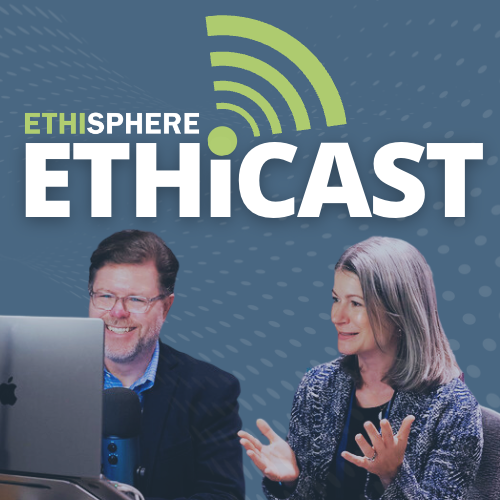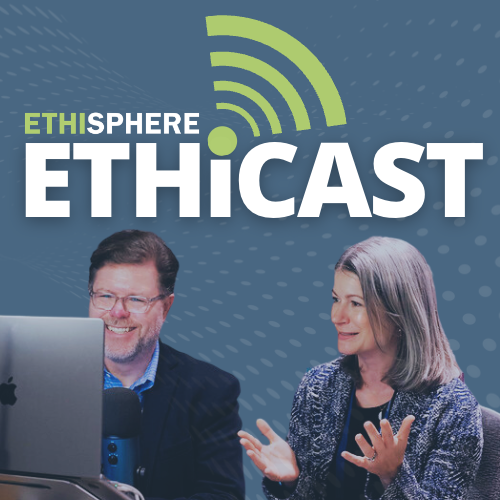[00:00:00] Speaker A: Hi, everyone. Changing regulatory enforcement priorities have wrought substantial developments for ethics and compliance teams. And in this episode, we'll take a look at what to expect from the securities and Exchange Commission. I'm your host, Bill Coffin, and this is the Ethicast.
Regulatory enforcement is an ever evolving condition that ethics and compliance leaders need to monitor to ensure that their programs are functioning at the highest levels. And so far, 2025 has been a year of regulatory transition. From changes in leadership across the federal enforcement apparatus to impactful executive orders from the president, the ways in which companies can expect to be held accountable for misconduct are undergoing substantial change or at the very least, significant clarification.
With us today to talk about this is Peter Chan, partner with the international law firm Baker McKenzie. Peter represents public companies, financial services firms and other organizations in litigation investigations and regulatory actions by federal agencies. Peter also has two decades of experience with the US sec, where he served as assistant Regional Director in the Chicago regional office. More specifically, Peter recently spoke with Kate Zolots, deputy Director west of the Enforcement Division of the sec, and gained valuable insight on that agency's current enforcement priorities. Peter, welcome to the Ethicast.
[00:01:27] Speaker B: Thank you, Bill. Really, really happy to speak with you today.
[00:01:31] Speaker A: Can you talk about the back to basics direction, namely not being so novel on legal theory when prosecuting that Deputy Director Zolots has in mind for the SEC's Western District?
[00:01:41] Speaker B: Yeah, actually, it's really interesting that we had this fireside chat in Los Angeles with Kate, and in speaking with her, we're able to get insights about the overall national enforcement program at this stage. And one thing she highlighted was indeed the back to basic concept and the idea that the enforcement staff is unlikely to be overly creative in terms of legal theories. And when we talk about back to basics, I want to split that up into both public companies and also with the financial industry with public companies.
We're of course, again talking about the reemphasis and further focus of the SEC on accounting fraud and disclosure and misstatements.
Now, this sounds simple, but it really is not because as you know, the world has changed since the days of Enron. And with the SEC's focus, we're talking about applying investigative techniques, new technology, data analytics to focus on detecting accounting and financial fraud, and also focusing on misstatements. To give you an example, it is the same old, same old with a new twist.
The SEC now also has a new unit called the Cyber and Emerging Technology Unit.
And a number of the folks that used to be in the crypto unit are now there and applying this back to basic concept of focusing on financial fraud and misstatements for public companies, yes, we're talking about earnings management shenanigans and so forth, but we're also talking about focusing on misstatements, material misstatements, dealing with emerging technology.
And so when we think about this back to basic is a back to basic theory applying to the current landscape, which may include scrutiny on statements dealing with AI or other technology. So it is somewhere in between, which is it is back to the future, so to speak. And with respect to financial industry, in talking to Kay, I do think there's a focus and emphasis on protecting retail mom and pop investors.
And so in that sense we're talking about conflicts of interest, overcharging of fees and expenses. And so for the financial industry audience thinking about risk perspective, the more vulnerable the investors, the less sophisticated the clients and customers, the greater the focus. By this back to basic approach, something.
[00:04:29] Speaker A: We'Re seeing is a broader effort by enforcement agencies to reward cooperation and remediation. What have you learned from your conversation with Deputy Director Zolots on this front? And more importantly, what advice would you have for companies to take advantage of this broader opportunity to gain declinations?
[00:04:47] Speaker B: I think this is huge.
According to Kate, the enforcement staff is is doubling down on rewarding and crediting self reporting, cooperation and remediation.
In doing so, in looking for instance at the public company side of things, Kate highlighted the 2006 corporate penalty policy statement. That by the way was supported by then Commissioner Atkins, who is now Chair Atkins.
In highlighting that statement, it is possible that in terms of investigations and enforcement actions dealing with public company, there may be smaller and perhaps no civil penalty against the public company under the theory that if you're dealing with accounting fraud, that is already a victimization of the shareholders and if you levy a heavy penalty against that company, you are re victimizing or reharming the same shareholders in that policy. And emphasized by Kay is the idea that instead for public company, but also for financial services firms, if there is true cooperation, and I want to talk a little bit more about that and remediation, but also self reporting with intentional fraud or other harmful conduct, we may be talking about reduction of penalty. But here's the takeaway and this ties back to the back to basic discussion that we just had for non fraud and non intentional violations. So for instance, technical violations dealing with controls or other rules that does not involve intentional fraud or massive harm, cooperation with remediation and potentially self reporting may not just mean lower penalty, it may mean no enforcement Case and way. If you combine the two concepts together, the back to basic focusing on fraud and the idea of rewarding cooperation, we are now talking about the importance of the in house legal and compliance team and the work they do.
Because if they spot a problem early and if they are able to advise remediation and importantly if they do a credible and complete internal investigation, that is actually investing the resources into figuring out what happened and either in response to SEC investigation or potentially even self reporting.
Now in this new frontier of back to basic good work of in house compliance and illegal combined with consultation outside counsel may mean no case and no enforcement action, which means no publicity even in some cases. So I think doubling down on internal compliance and the quality of internal investigation, but also true incredible remediation of solving the problems, being able to tell the SEC we spot a problem, but you don't need to worry about us in the future can do be saving public companies and financial services firms millions and millions of dollars in bad publicity.
[00:08:21] Speaker A: This shift away from the broken windows era of enforcement sounds like welcome news for many organizations. Even though there's like this enhanced emphasis on holding individual wrongdoers, including executive leaders accountable, how can ethics compliance teams best adjust their program to maintain appropriate levels of protection for their organizations?
[00:08:41] Speaker B: I think it comes down to good internal review and investigation and also spotting accountability to provide remediation. Let me kind of step back on this focus by the current SEC on individuals.
So back when, when I was an assistant director at the sec, among other things I did present enforcement recommendations to the commission where now Chair Atkins was a commissioner at the SEC and even then Commissioner Atkins, and this is all public have the belief that companies by themselves don't commit fraud, individuals do.
And so in any recommendations to the commission involving commissioner and Commissioner Atkins, the question is, well, this recommendation involves this supposed fraud by this large company, but who were involved and who were accountable and who were responsible. It doesn't mean by the way that that will automatically lead to enforcement actions against individuals. But there's an expectation by the then commission and now this current commission under Chair Atkins to be able to answer the question as to, well, who dropped the ball, if any and if no one dropped the ball, should there be an enforcement case? But if there's an enforcement case, shouldn't individuals be held accountable? And so going back to credible internal investigation and remediation, I think we necessarily have to answer the question if there's ever interaction with the SEC as to well, okay, there is this systemic issue, there's this problem, there's this misstatement? Well, there's this conflict of interest.
Well did anyone fall asleep at the switch?
Did anyone intentionally do this?
Or did someone accidentally or inadvertently miss something? Or perhaps it's a lack of resources and in which case who was responsible to making sure that there were adequate resources.
Being able to answer these questions are important but it's a double edged sword because one, under this new commission it may mean greater likelihood of enforcement action against individuals as opposed to the previous commission where you see large settlement of millions and millions of dollars but not a single action against individuals. So I think in that sense as part of this double edged sword, I think there is now perhaps a tougher environment for individual accountability.
The flip side of that is that if based on an accurate internal investigation, it shows that no one is really responsible. It just, you know, from a systemic or unfortunate event, something happened that led to a misconduct, but no one individually can be assigned with true accountability.
That may also inform the commission as to whether enforcement action is necessary, particularly if there's remediation. And the last point of remediation is that even if an individual is not charged by the sec there are often situations where in showing good remediation it may mean addressing from an HR perspective individuals that might need to have a different position or be transferred or be replaced because someone better need to handle that important responsibility that would avoid future misconduct. So this is all interlinked Bill, if that makes sense. The back to basics, the cooperating remediation and the focus on individuals, they're all tied to a renewal and holistic view as to how to really have effective enforcement by this division. Enforcement. And I think those are some of the really insightful observations for my discussion with Kate. She is the Deputy director of the west region which is a new position that means she oversee all investigations from the west coast all the way to Texas. And so when you spoke, we listened.
[00:13:10] Speaker A: Yeah, no doubt. Peter, I do have one more question for you. There has been a lot of talk about, you know, the suspension of FCPA enforcement, but a lot of that has been around the DOJ side of the issue. We all know the SEC also enforces the fcpa. So what are you seeing there that ENC teams should bear in mind?
[00:13:30] Speaker B: Yeah, I think the long and short of it is don't let your foot off the gas pedal when it comes down to compliance in terms of anti corruption.
Now that said, I think the SEC is in the midst of internal discussion and deliberation on FCPA enforcement.
When I spoke to Kate, she acknowledged that the SEC is taking into consideration the White House executive order involving FCPA and the tie to geopolitics and and national security and interest. She also took note of the DOJ guideline that was issued. But very often in speaking with a senior leader such as Kay, no comment and silence is itself a data point. She did not say that at the time that the SEC is adopting these policies and she did not say that the guideline of DOJ is now the guideline of the sec.
And I think that lack of further comments is a data point that we are still what we call in a stay tuned period right now. I do note that just as we're speaking today that the SEC have voluntarily dismissed this lawsuit in a cognizant FCPA case that was also combined with the doj.
And I do think that there is going to be some serious adjustment on fcpa. But that said, one thing I always want to tell our clients is that the statute of limitation for the SEC civilly is at a minimum five years.
And in terms of intentional fraud and dealing with the Scorchman, we're dealing with 10 years. And so I think there's the short game and then there's the long game. And when you consider the long game and the long term interest of companies and corporations, and also in light of the unpredictability of this White House when it comes down to national security and geopolitics, I would caution against any decrease in effort on compliance dealing with fcpa. And then now we tie that back to cooperation and remediation and good internal investigation.
It may be that in the midst of this uncertainty of fcpa, strong compliance, strong internal investigation and remediation may have a greater chance of no case as opposed to just lower penalty in the world of fcpa.
[00:16:06] Speaker A: Well Peter, thank you for bringing your regulatory insights to the show. It's always great to feature our friends at Baker McKenzie.
[00:16:12] Speaker B: Thank you very much for having this discussion with me, Bill.
[00:16:15] Speaker A: For the latest insights from Peter and his colleagues, visit bakermackenzie.com for a wide range of free reports, articles and videos on regulatory enforcement, speak up, culture manager training and more, visit the Ethisphere resource
[email protected] resources if you'd like to appear as a guest on this program to share an ethics and compliance best practice or success story, drop us a
[email protected] Ethicast thanks for joining us. We hope you've enjoyed the show. For new episodes each week, be sure to subscribe on YouTube, Apple Podcasts and Spotify. And until next time, remember, strong ethics is good business.


